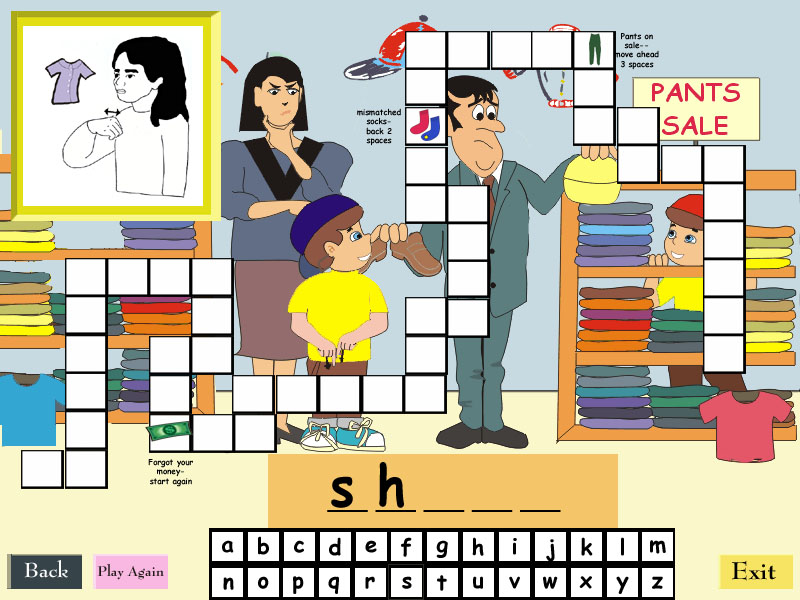Language game
Game languages or language games (not to be confused with the philosophical concept of the language game ) are playful modifications of existing languages. They are very popular in many regions, especially in children and can play a positive role in language acquisition. Due to the usually very strict transformation rules they are expected to constructed languages.
Chickens language
After each vowel ( vowel ), "h " is inserted. Subsequently, the vowel is repeated and the syllable " - def " is set. Finally, the vowel is repeated once more.
Example: " The internet is great." → Dahadefas Ihidefintehedefernehedefet ihidefist tohodefoll.
Spoon language
They spoke in the language spoon into syllables, which facilitates the exchange of views and a foreign audience does not necessarily know when a word is finished and when not. Whenever a vowel comes, it will be replaced by "same vowel lew vowel itself ." In diphthongs, the ( spoken) with a start ( " ei" and "au" ) is usually but rather " alew vowel itself " is used. So: e = elewe a = Alewa i = ilewi o = olewo u = ulewu u = ülewü ö = ölewö ä = älewä ei = eilewei or alewei ( eg. "egg" = " Alewei " ) au = aulewau or alewau ( eg. "house" = " Halewaus " ) ie = i ( e) lewi (s) eu = euleweu
Sample sentences: " Good morning! " = " Gulewutelewen Moleworgelewen! " "When do you have time? " = "Whales When halewast dulewu line width? " Or "Whales When halewast dulewu Zaleweit? " "When you come to me? " = "Whales When kolewommst dulewu zulewu milewir? " " How are you? " = " Wielewie geleweht elewes dilewir? "
Some people use other than " lew " even " lef " and " lof ".
Peas language
The peas language is created (or " pea " ) by insertion of the word " pea" after each letter of a word.
Example: The word " peas language" translated into the language peas that " pea rerbse berbse serbse pea nerbse serbse perbse rerbse arbse cerbse herbse eerbse ".
Gibberisch
The term Gibberisch (English: Gibberish ) is mainly used for a completely customized fantasy language, which is called a synonym also grammelot.
In this form of linguistic articulation there are no rules; speech is free of any statements. This principle creates numerous opportunities for individual and group exercises, for example in the context of improvisation and relaxation technique. Here, the actual speech act has no binding to controlled content must have more. The respective actors can concentrate on the game and so relaxing.
Grüfnisch
Grüfnisch is in Switzerland, among adolescents and children, a widely used language game. This language is used by many children and young people as a secret language. In " Grüfnisch " are the vowels a, e, i, o, u, ä, ö and ü by Anafa, enefe, inifi, onofo, unufu, änäfä, önöfö and ünüfü replaced (for example: " Hanafallonofo " = " Hello "). Exception: For diphthongs / Zwielauten only the first extended ( for example, " au " ⇒ " anafau " )
Pig Latin
In Pig Latin the beginning of the first syllable is placed at the end of the word and extended by a suffix. Variants thereof in the German-speaking area are Matt English and Kedelkloppersprook.
Raiders language
The robbers language is a secret language in the three novels by Kalle Blomquist by Astrid Lindgren. Here, each consonant is doubled and an "o " is set in between. Thus, " Blomquist " to " Kokalollole Boblolomomquoquisostot ".
See: Kalle Blomquist
Syllable twisting
In some languages, there are game languages , based on the fact that the syllables are reversed, in French, for example, Verlan, in Argentine Spanish vesre.
B language and the like.
In some versions of game languages , such as the B language ( in this BEBE Sprabachebe called ), vowels are doubled and given letters (in this case B) or syllables inserted. Diphthongs count either as single vowels or are severed.
Example: " Kabannst dubu mibir sabageben, wobo dubu wibillst hibinfabahreben? " ( "Can you tell me where you want to go? " )










